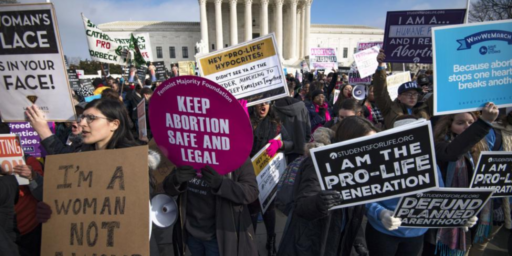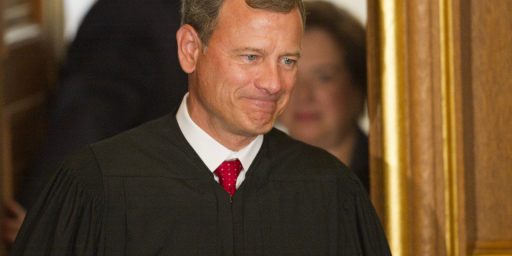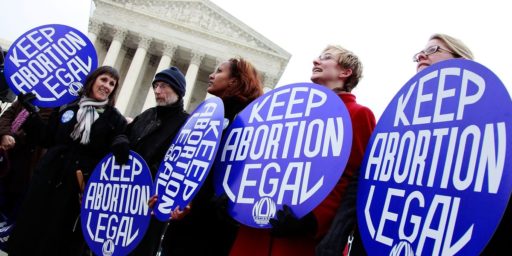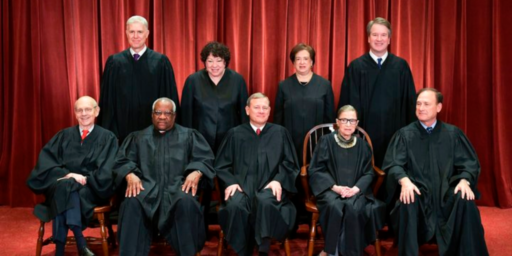Roberts: Abortion Issue “Settled”
John Roberts may have considerably set back his prospects for getting confirmed as the next Chief Justice of the Supreme Court, telling the Senate that Roe vs. Wade is “settled law.”
Roberts: Precedent Settles Abortion Ruling (AP)
Supreme Court nominee John Roberts said Tuesday that the landmark 1973 ruling legalizing abortion was “settled as a precedent,” as he was immediately pressed to address the divisive issue on the second day of his confirmation hearings. “It’s settled as a precedent of the court, entitled to respect under principles of stare decisis,” the concept that long-established rulings should be given extra weight, Roberts told the Senate Judiciary Committee.
President Bush’s choice to succeed the late William H. Rehnquist as chief justice, Roberts focused on a 1992 Supreme Court ruling in Casey v. Planned Parenthood, referring to that as a precedent-setting case in addition to the 1973 Roe v. Wade ruling. In the Pennsylvania case, the Supreme Court voted 5-4 to uphold the core holdings of Roe v. Wade and ban states from outlawing most abortions. The court said states could impose restrictions on the procedure that do not impose an “undue burden” on women. “It reaffirmed the central holding in Roe v. Wade,” Roberts said.
[…]
Specter, a moderate Republican who supports abortion rights, asked if the Roe v. Wade decision was a “super-duper precedent” in light of efforts to overturn it. Roberts noted that the Supreme Court itself upheld the basics of Roe v. Wade in the 1992 Casey case. “That, I think, is the decision that any judge in this area would begin with,” Roberts said.
Sen. Patrick Leahy of Vermont, the ranking Democrat on the committee, focused on the balance of power between the executive branch and Congress — and Roberts’ suggestion, in past writings, that favor the presidency and speak dismissively of the legislature.
[…]
Specter pressed Roberts on whether the abortion ruling was settled law for him, established only for an appellate judge such as he or “settled beyond that.” “Well, beyond that, it’s settled as a precedent of the court, entitled to respect under principles of stare decisis. And those principles, applied in the Casey case, explain when cases should be revisited and when they should not,” Roberts said.
In 1992, Rehnquist wanted to use the Casey case to overturn Roe, but he was stymied by moderate Justice Sandra Day O’Connor, who is retiring. Justice Antonin Scalia wrote a bitter dissent then, and is likely to push the court to revisit the issue. An abortion case will be taken up by the court this fall, but it does not directly deal with the right to an abortion. The Supreme Court’s next term begins Oct. 3.
The mere fact that the Supreme Court rules on something does not make it settled law. Abortion remains the single most controversial issue in American public policy, precisely because many view the Roe precedent as illegitimate. The right to abortion was created in 1973 as an extension of the right to privacy created in 1965. Neither have any but a tangential basis in the Constitution.






So how does that hurt his chances? Are you assuming that conservative senators will dump him?
I’m afraid that will lift his chances!
I also need some help finding “super precedent” in my dog eared copy of the Constitution.
DL,
It is on the page right before “ultra-super-duper” precedent. 🙂
Just so its not a
Secret Double-Jeopardy precedent.
Bush has sold out us conservatives again. First he abandons realism in foreign policy, increases the police power of the state, and now appoints a liberal (whose wife is a self-declared feminist) to the court.
Just like his papa, little georgie is liberal to the bone.
Unfortunately for the Associated Press, “that term doesn’t mean what you think it means.” Stare decisis does not have to do with the “long-standing-ness” of rulings, but simply the ongoing validity of a previous ruling.
Sen. Spector is trying to imply that some previous rulings are more valid than others, but they are not, nor has Mr. Roberts agreed that they are.
By stare decisis a ruling is valid until and unless it is altered by legislation or overturned by a subsequent ruling. So Brown v. Board of Education overturned Plessy v. Ferguson. Plessy v. Ferguson was the valid ruling before being overturned; Brown v. Board is now the valid ruling.
In a similar way, Roe v. Wade and Planned Parenthood v. Casey are now valid rulings.
The concern is that Mr. Roberts might rule to overturn one or both of these.
What is going on is an effort to get him to commit in advance that he would never do so. He will avoid that trap.
whose wife is a self-declared feminist
Boy are you ill-informed! She is a “self-declared feminist” in that she has been a leader in “Feminists for Life“, a group characterized by its strong stand against Roe v. Wade!!
As for the “settled law” remarks. Can’t you see that Roberts is simply making a point he has to make in the current political environment?
But please note what he does and doesn’t affirm. He assures them that he believes giving weight and respect to precedent. But whatever the libs try to suggest, every justice, including Thomas [the one most likely, in principle, to set precedent aside] believes in some form of stare decisis, and for that matter all of them are willing to overturn what they regard as bad precedent (as liberals have done a number of times recently!). So this really a non-issue.
What to take note of, then, is what he says that is different and distinctive.
First, note that Roberts clearly refused to give in to Specter’s pressure to declare Roe some sort of “super precedent”.
But even more striking is that he doesn’t make a general statement in favor of stare decisis and leave it there (as I seem to recall even Thomas did!) He choose to addresses (several times!) the limits of stare decisis, explaining why the court has acted or might legitimate act, to overturn a precedent!
If he’s really just fine with Roe v Wade and could not imagine overturning it, why would he put that out there? As it is, he has acknowledged what is, made it clear that he respects precedent (and so can’t be pegged as the flamethrower on a mission to fix this nutty court!), but articulated the basis on which he could decide to undo it!
Another thing to keep in perspective. It’s not so certain that the court will even get a good opportunity any time soon to overturn Roe outright. (That’s simply based on the sort of cases working their way through the system.)
It most certainly will, however, hear a number of cases involving various restrictions, e.g., partial birth, parental notification. These present the opportunity to “chip away” at the substance of Roe v Wade. There is plenty of reason to believe that Roberts, together with others of his sort Bush appoints would be inclined and able to do so.
It’s just possible that such an incremental route will more effectively free us from Roe than would the immediate outright overturn (i.e., returning it all, immediately, to the states). Then, at the end of the process, the empty shell could be discarded.
In fact, Roberts’ remarks today may have laid part of the groundwork for such a process. Please note the following:
Whether or not particular precedents have proven to be unworkable is another consideration on the other side — whether the doctrinal bases of a decision had been eroded by subsequent developments.
For example, if you have a case in which there are three precedents that lead and support that result and in the intervening period two of them have been overruled, that may be a basis for reconsidering the prior precedent.
(And when Specter then tries to get him to assert that the “doctrinal bases” for Roe have not been undermined, Roberts refuses to answer!)
The right to abortion was created in 1973 as an extension of the right to privacy created in 1965. Neither have any but a tangential basis in the Constitution.
You say “created,” I say “recognized” …
Well, they recognized it hiding in emanations of shadows of rights that had been enumerated 174 years earlier and not theretofore “recognized.” Abortion in particular was certainly outlawed, and routinely so, for decades at least. Rather clearly, the states had the right to legislate on that issue.
I watched and listened to what Roberts said very carefully. I did not hear him commit one way or another what he would do on Roe V Wade. What i did see and hear was Roberts beat back the morally and ethically ignorant dumb o crats try to pin him down. Roberts made them look like fools in their quest to Nail him on various issues.
I got a big chuckle out of the entire thing because it reminded me of the Iran gate hearings when Ollie North made them all look like the fools they are and Ollie never really answered a question that came up.
The dumb o crats in the Senate are following the obstructionist agenda they have followed since Bush 11 beat their pants off. (both times)
It is indeed sad when one thinks that these guys are making laws that effect you and I and have no sense of common decency, ethics, or morals.
He endorsed Griswold, which certainly is a start.
The big problem for social conservatives isn’t Roe, but rather Casey, which not only upholds Roe, but also sets forth a standard of stare decisis. Now, in order to overrule Roe, they also have to dump Casey’s theory on stare decisis.
A lot of folks have missed how the ground has shifted because of Rehnquist’s death. He’s replacing Rehnquist, as reliable a vote social conservatives have ever had on the court. If Roberts turns out to be in favor of upholding Roe (I still think he’ll vote to overrule), then the movement to get Roe overturned is dead, dead, dead.
It seems that there are a lot of republican conservatives here who do not want to have a right to privacy. Fine. Give yours up, I don’t care. Just leave mine alone.
Without a federally protected right to privacy you will have no recourse if your city, county or state makes public your school, medical, bank, credit or work records for all to see.
Without a right to privacy you will have no recourse if your city, county or state outlaws liposuction, breast implants, braces, dentures, bikini waxing or mohawk haircuts.
Roberts did what Ginsberg did and said “nothing” substantive about possible upcoming cases. All else is speculation.
It’s really this simple to defeat those hoping Roe is settled and therefore cannot be challanged.
If court rulings settled the matter, Brown would never have existed, because of Plessy.